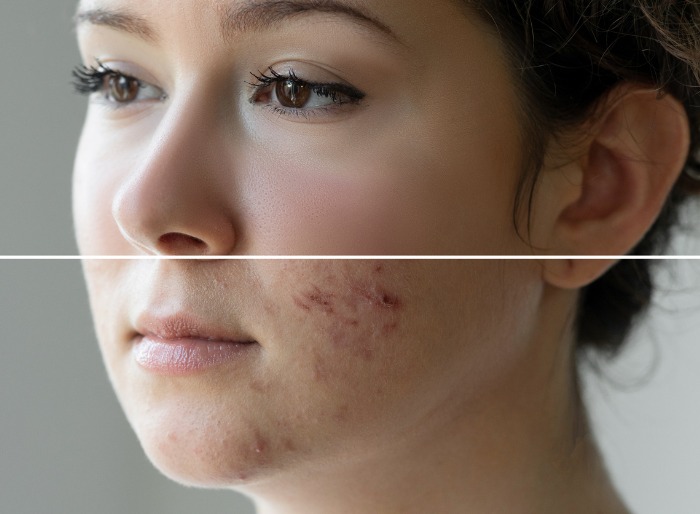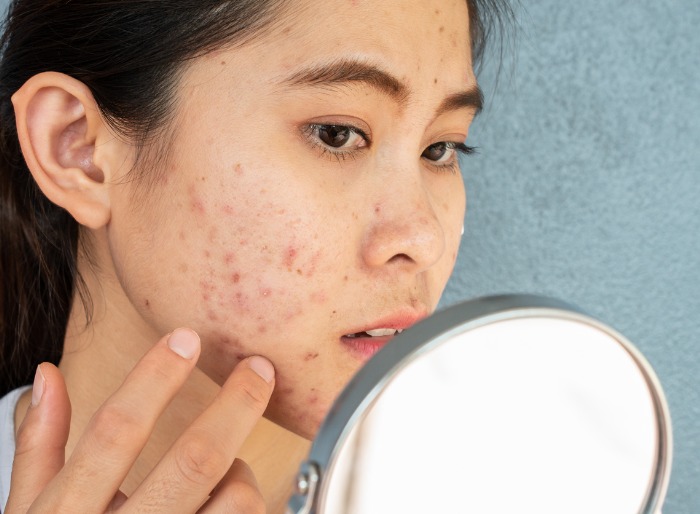Acne vulgaris, the medical term for common acne, can severely impact your self-perception and confidence, whether it’s a severe or mild outbreak. Covering it up with make-up or using the wrong types of treatments can make it worse. Because each case is unique and effective treatments vary, it’s important to get counseling from a dermatology specialist to determine the best acne treatment for your skin. At Dermatology Associates, we provide the highest quality of medical dermatology with personalized treatment plans, personable support, and state-of-the-art equipment. Whether your case is mild or severe, teenage acne or adult acne, we can help you clear up acne breakouts and manage future outbreaks. Schedule an acne appointment today and get the clear skin you’ve always wanted!

Common Types Of Acne
Acne can be separated into two types, inflammatory acne and non-inflammatory acne, though each type appears differently depending on how it’s formed and the affected body areas. Non-inflammatory acne is usually less severe and does not cause swelling or discomfort, while Inflammatory acne is typically more severe and can cause acne scars.
- Blackheads: Also known as open comedones, these unsightly black spots develop when the skin’s pores fill with excess oil and dead skin. They are essentially the same as whiteheads, except the pore is open, which oxidizes the oil and dead skin, making them hard and appear dark.
- Whiteheads: Also known as closed comedones, whiteheads form due to the accumulation of dead skin and oils in the pore, but in closed pores, so the skin and oil appear white and do not harden.
- Papules: Papular acne is the beginning stage when the bumps are still red with no white head. They are inflammatory acne, often tender to the touch with a red appearance.
- Fungal Acne: Known as pityrosporum folliculitis, this is when excess yeast develops in the pore, causing it to become itchy and inflamed.
- Nodules: Nodular acne develops when excess oil, dead skin, and bacteria clogs your pores, except instead of coming to a visible head, it becomes inflamed deeper in the skin. Unlike regular acne, these can persist for weeks and even months.
- Cysts: While cystic acne does develop deeper in the skin, like nodular acne, cystic acne is filled with pus, so they are softer. They are usually caused by excess black or whiteheads spilling over into the surrounding pores causing your body to react as though there is an infection.
- Pustules: Pustular acne is the next stage of papules that develops a whitehead or pimple after a few days. While it’s tempting to pop them, this can lead to infection and scarring.
- Hormonal Acne: Flares with changes in hormones from medications or natural cycling. The location of blemishes and treatments are specific to this type.
What Causes Acne?
While acne is directly caused by an excess of oil, dead skin, and bacteria, different factors can cause or worsen acne, especially the production or sensitivity to the bacteria. This can include any of the following.
- Changing Hormones, Such As During Teenage Or Young Adult Years, Or During The Time Around A Woman’s Period.
- Wearing Restrictive Clothing For Long Periods Of Time, Which Promotes Sweating. This Can Include Hats And Sports Helmets.
- Air Pollution And Weather Conditions, Such As High Humidity.
- Using Oily Or Greasy Personal Care Products, Such As Lotions, Creams, Or Hair Styling Products.
- Working Around Grease, Such As In A Restaurant Where Food Is Fried.
- Excess Stress.
- Using Products That Excessively Dry Out Your Skin Can Increase Oil Production To Overcompensate.
- Picking Or Popping Current Acne Flare-Ups.
- Certain Foods That Are High In Sugar, Grease, Or Fat, Such As Deep-Fried Foods And Dairy.
- Certain Medications.
Acne Treatment
There’s no magical cure for acne, no matter how much we may want it. In fact, acne treatment often comes down to trial and error of a combination of treatments to discover the right solution for your unique skin. Having the input of a skincare specialist can help you quickly determine what is and is not working for you. Common treatments include the following.
- Benzoyl Peroxide: Can be used as a wash or a cream/gel and is effective for mild acne and acne in children.
- Azelaic Acid & Salicylic Acid. Can be used as a wash or a cream/gel and is safe to use for pregnant or breastfeeding women.
- Retinoids & Retinoid-Like Drugs. Prevents the plugging of hair follicles, the origin of most blemishes. May cause some sensitivity to the sun; sun protection is recommended
- Dapsone. Works well for women with inflammatory acne.
- Oral & Topical Antibiotics: Treats the infection within the pores that can increase the severity of acne breakouts. Often used with benzoyl peroxide to prevent antibiotic resistance.
- Hormonal Treatments: Can be effective in women and girls to help offset hormones that cause acne breakouts.
- Isotretinoin.: A derivative of Vitamin A and an option for people who have not shown improvement with other treatments. Should not be used if you are pregnant or may become pregnant.
- Extraction: Uses specialized tools are used to drain and extract whiteheads and blackheads that have not responded to other treatments. May cause scarring.
- Steroid injection. Used for nodular and cystic acne to help improve the lesions and reduce swelling and pain.

How To Prevent Acne
Discovering what triggers acne outbreaks for your body can be a long process but well worth it. In general, avoid skincare and make-up products that can cause clogged pores. Instead, look for labels that say “non-comedogenic” or “oil-free.” Watching what you eat and staying hydrated is also important. Regular exercise can also help combat stress, leading to acne. Just be sure to properly shower afterward and use a light moisturizer if your skin is prone to dryness. If you already suffer from acne scard, cosmetic dermatology treatments, such as microdermabrasion and laser treatments, can be effective as acne scar treatment to improve the appearance of scars on the spots have been managed. Contact our dermatology associates today to learn more!